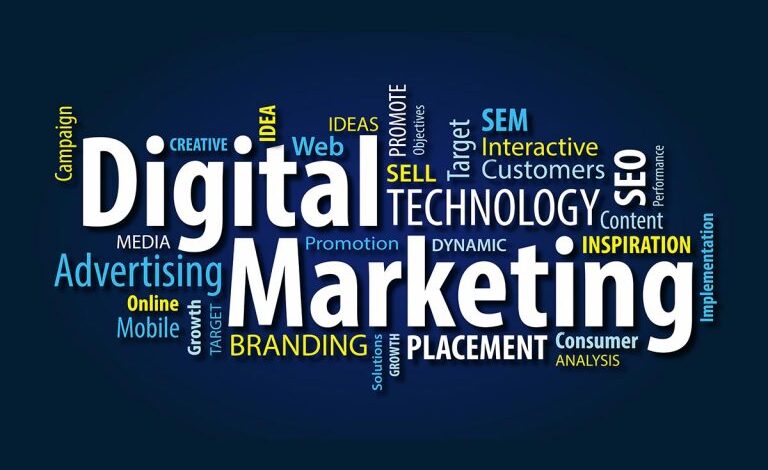Comprehensive Insights and Strategies Of Digital Marketing

Introduction to Digital Marketing
In today’s digitally driven world, mastering digital marketing is essential for any business aiming to succeed. Digital marketing refers to the use of digital channels to promote or market products and services to consumers and businesses. It is a broad field, including attracting customers via email, content marketing, search platforms, social media, and more. With the majority of consumers and businesses increasingly engaging online, digital marketing has become the cornerstone of many organizations’ overall marketing strategy.
What is Digital Marketing?
Digital marketing is the practice of promoting products or services with the help of digital channels to reach a targeted audience. It is a broad term that encompasses various marketing tactics and technologies used to reach consumers through digital means. Digital marketing extends beyond internet marketing to include channels that do not require the use of the internet. It encompasses a variety of channels, such as social media, mobile applications, email, web applications, search engines, websites, or any new digital channel.
The Evolution of Digital Marketing
Digital marketing has evolved from simple banners displayed on websites to sophisticated multi-channel strategies that can include email, social media, search engine optimization, and much more. Early digital marketing was marked by email campaigns and basic online advertising, but as technology advanced, the complexity of these strategies grew. Today, digital marketing includes a vast array of activities intended to bring people to your business, convert them to customers, and keep them coming back.
Key Components of Digital Marketing
Search Engine Optimization (SEO)
SEO is the process of optimizing your website to “rank” higher in search engine results pages, thereby increasing the amount of organic (or free) traffic your website receives. The channels that benefit from SEO include websites, blogs, and infographics. This involves the tweaking of website architecture, optimizing keyword usage, and ensuring the mobile-friendliness of your design.
Search Engine Marketing (SEM)
SEM or search engine marketing covers the ground SEO ignores, paid traffic from search engines. With SEM you purchase advertisement space that appears on a user’s SERP. The most common paid search platform is Google AdWords. Next, is Bing Ads. With search engine marketing, advertisers only pay when a user clicks on their ad.
Content Marketing
Content marketing denotes the creation and promotion of content assets for the purpose of generating brand awareness, traffic growth, lead generation, and customers. The key tools and channels involved in content marketing include blogs, ebooks, and online brochures, and infographics.
Digital Marketing Strategies
A good digital marketing strategy is well-rounded and crafted with the end goal in mind. This can involve multiple digital touchpoints depending on the business model and the demographic of the target audience.
Targeting and Personalization
Digital marketing enables the execution of a highly personalized marketing strategy. You can dissect huge demographics into targeted groups, each receiving tailored messages that resonate with their specific needs and desires.
Data-Driven Marketing
In digital marketing, every interaction is measurable. This data-driven approach helps marketers to analyze demand, recognize consumer patterns, predict trends, and sometimes even get ahead of them.
Tools and Technologies in Digital Marketing
Modern digital marketing is underpinned by a suite of powerful tools and technologies that provide insights into campaign success and streamline marketing processes.
Automation Tools
Marketing automation is an integral component of digital marketing. Tools like HubSpot, Marketo, and MailChimp streamline important marketing tasks. They help deliver more personalized messages to customers and prospects based on their behavior and preferences.
Analytical Tools
Tools such as Google Analytics and Adobe Analytics give digital marketers deep insights into their audience’s behavior. These tools can show how campaigns are performing and what kind of engagement and interaction they are receiving.
Challenges in Digital Marketing
Despite its many benefits, digital marketing presents several challenges including data privacy issues, a high level of competition, and constantly evolving digital technology. Navigating these challenges requires a deep understanding of both the technology and the ever-changing consumer landscape.
The Future of Digital Marketing
The future of digital marketing lies in more personalized, automated, and data-driven strategies. Technologies like AI and machine learning are expected to play a significant role in shaping the future of marketing by making data analysis more efficient and helping marketers understand consumer behavior more deeply.
Conclusion
Digital marketing is an ever-evolving field that requires creativity, tactical planning, and a deep understanding of digital media platforms. Businesses that can effectively integrate digital marketing into their overall marketing strategy are likely to see significant growth in their brand and revenue streams.
FAQs
- What is the difference between SEO and SEM?
- SEO is about optimizing your website to get higher rankings in the organic results while SEM involves paying for search ads to get traffic from search engines.
- How do I measure the success of my digital marketing efforts?
- Success can be measured using various metrics, including traffic, leads, and sales. Tools like Google Analytics can help track these metrics.
- What is content marketing?
- Content marketing involves creating and sharing valuable content to attract and convert prospects into customers, and customers into repeat buyers.
- What digital marketing trends are on the rise?
- Personalization, artificial intelligence, and video marketing are some of the major trends currently shaping digital marketing.
- How important is mobile marketing within digital marketing?
- With the increasing use of smartphones, mobile marketing is extremely important, as it’s one of the most direct and personal forms of marketing today.




